介词和介词短语的概念
介词和介词短语的常见用法总结
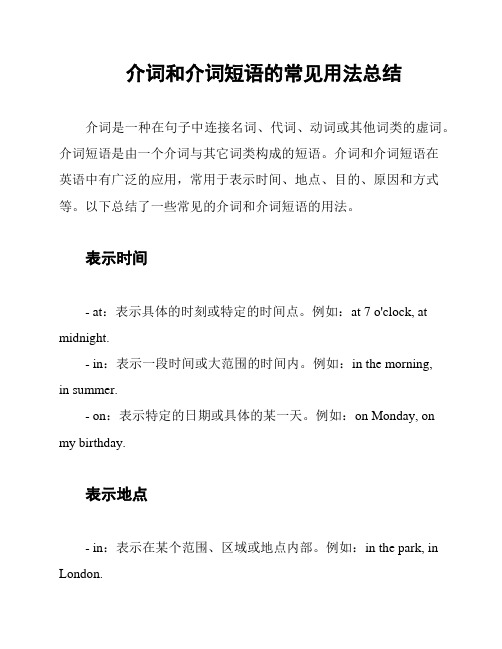
介词和介词短语的常见用法总结介词是一种在句子中连接名词、代词、动词或其他词类的虚词。
介词短语是由一个介词与其它词类构成的短语。
介词和介词短语在英语中有广泛的应用,常用于表示时间、地点、目的、原因和方式等。
以下总结了一些常见的介词和介词短语的用法。
表示时间- at:表示具体的时刻或特定的时间点。
例如:at 7 o'clock, at midnight.- in:表示一段时间或大范围的时间内。
例如:in the morning,in summer.- on:表示特定的日期或具体的某一天。
例如:on Monday, on my birthday.表示地点- in:表示在某个范围、区域或地点内部。
例如:in the park, in London.- on:表示在某个表面或位置上。
例如:on the table, on the wall.- at:表示在某个具体的地方或位置。
例如:at home, at the bus stop.表示目的- for:表示为了某个目的或目标。
例如:for studying, for fun.- to:表示朝向某个目标或方向。
例如:to the park, to the station.表示原因- because of:表示由于某个原因。
例如:because of the rain, because of her illness.- due to:表示由于某个特定的原因。
例如:due to budget constraints, due to his absence.表示方式- by:表示通过某种方式或方法。
例如:by car, by email.- with:表示使用某种工具或伴随的状态。
例如:with a pen, with a smile.以上是一些常见的介词和介词短语的用法总结。
在实际使用中,要根据具体的语境和表达需要来选择合适的介词和介词短语。
介词和介词短语的概念
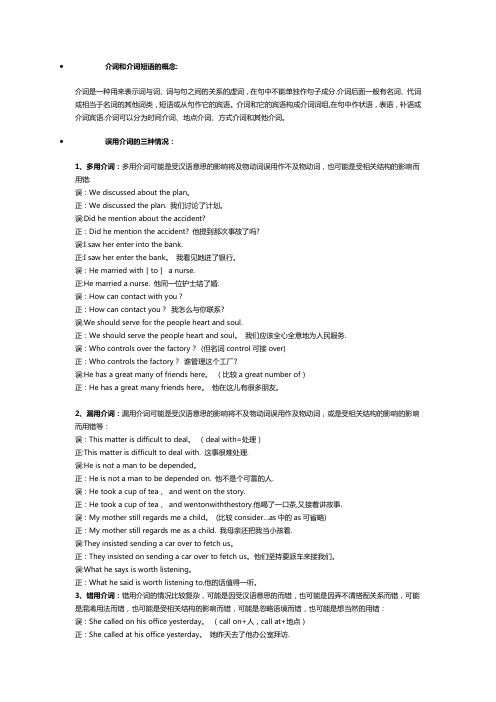
•介词和介词短语的概念:介词是一种用来表示词与词、词与句之间的关系的虚词,在句中不能单独作句子成分.介词后面一般有名词、代词或相当于名词的其他词类,短语或从句作它的宾语。
介词和它的宾语构成介词词组,在句中作状语,表语,补语或介词宾语.介词可以分为时间介词、地点介词、方式介词和其他介词。
•误用介词的三种情况:1、多用介词:多用介词可能是受汉语意思的影响将及物动词误用作不及物动词,也可能是受相关结构的影响而用错:误:We discussed about the plan。
正:We discussed the plan. 我们讨论了计划。
误:Did he mention about the accident?正:Did he mention the accident? 他提到那次事故了吗?误:I saw her enter into the bank.正:I saw her enter the bank。
我看见她进了银行。
误:He married with[to]a nurse.正:He married a nurse. 他同一位护士结了婚.误:How can contact with you?正:How can contact you?我怎么与你联系?误:We should serve for the people heart and soul.正:We should serve the people heart and soul。
我们应该全心全意地为人民服务.误:Who controls over the factory?(但名词control可接over)正:Who controls the factory?谁管理这个工厂?误:He has a great many of friends here。
(比较a great number of)正:He has a great many friends here。
介词短语语文知识点总结
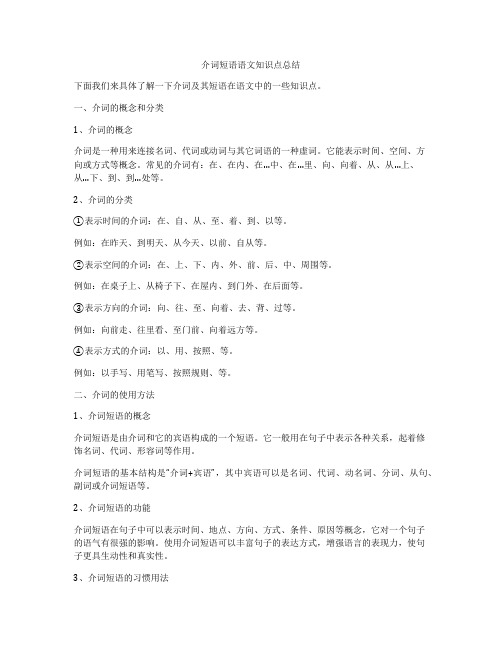
介词短语语文知识点总结下面我们来具体了解一下介词及其短语在语文中的一些知识点。
一、介词的概念和分类1、介词的概念介词是一种用来连接名词、代词或动词与其它词语的一种虚词。
它能表示时间、空间、方向或方式等概念。
常见的介词有:在、在内、在…中、在…里、向、向着、从、从…上、从…下、到、到…处等。
2、介词的分类①表示时间的介词:在、自、从、至、着、到、以等。
例如:在昨天、到明天、从今天、以前、自从等。
②表示空间的介词:在、上、下、内、外、前、后、中、周围等。
例如:在桌子上、从椅子下、在屋内、到门外、在后面等。
③表示方向的介词:向、往、至、向着、去、背、过等。
例如:向前走、往里看、至门前、向着远方等。
④表示方式的介词:以、用、按照、等。
例如:以手写、用笔写、按照规则、等。
二、介词的使用方法1、介词短语的概念介词短语是由介词和它的宾语构成的一个短语。
它一般用在句子中表示各种关系,起着修饰名词、代词、形容词等作用。
介词短语的基本结构是“介词+宾语”,其中宾语可以是名词、代词、动名词、分词、从句、副词或介词短语等。
2、介词短语的功能介词短语在句子中可以表示时间、地点、方向、方式、条件、原因等概念,它对一个句子的语气有很强的影响。
使用介词短语可以丰富句子的表达方式,增强语言的表现力,使句子更具生动性和真实性。
3、介词短语的习惯用法介词短语的使用有一些习惯用法,这些习惯用法是我们理解介词短语的重要依据。
例如:in front of(在…前面)、on the left(在…左边)、at the back of(在…后面)、up to(直至)、from…to(从…到)、beside(在…旁边)、across from(在…对面)等。
三、介词短语的构成和功能1、介词短语的构成介词短语是由介词和它的宾语构成的一个短语。
宾语可以是名词、代词、动名词、分词、从句、副词或介词短语等。
例如:in the classroom(在教室里)、through the window (透过窗户)、toward the north(朝北方)、by the way(顺便说一下)等。
介词和介词短语用法

构成方式
介词+名词
01
如“在桌子上”、“从北京来”等,介词后接名词构成介词短
语。
介词+代词
02
如“把它给我”、“为你着想”等,介词后接代词构成介词短
语。
介词+动名词
03
如“在跑步”、“关于学习”等,介词后接动名词构成介词短
语。
在句中位置及功能
句首位置
介词短语可置于句首,作为句子 的状语,表示时间、地点、方式 等,如“在春天里,万物复苏。 ”
组成的。
如because of,in front of,in spite of等,这类 介词是由短语构成的。
分词介词
如concerning, regarding等,这类介词 是英语中的“-ing”分词
形式。
介词与其他词类关系
介词与名词的关系
介词必须接名词或相当于名词的词作宾 语,构成介宾短语,在句中充当状语、
翻译题
将中文句子翻译成英文,注意介词的正确使用,如"他在房 间里。"应译为"He is in the room."
深入学习资源推荐
语法书籍
《英语语法大全》、《英语语法手册》等,这些书籍详细介绍了介 词的用法和例句。
在线课程
各大在线教育平台提供的英语语法课程,如Coursera、edX等,这 些课程通常包括介词用法的讲解和练习。
介词的主要作用是表示名词、代词等与句中其它词的关系,在句中不能单独作句子 成分。
介词后面一般有名词、代词或相当于名词的其他词类、短语或从句作它的宾语,表 示与其他成分的关系。
常见介词类型
简单介词
复合介词
短语介词
如at,in,on,by, with等,这类介词是由
英语中的介词和介词短语
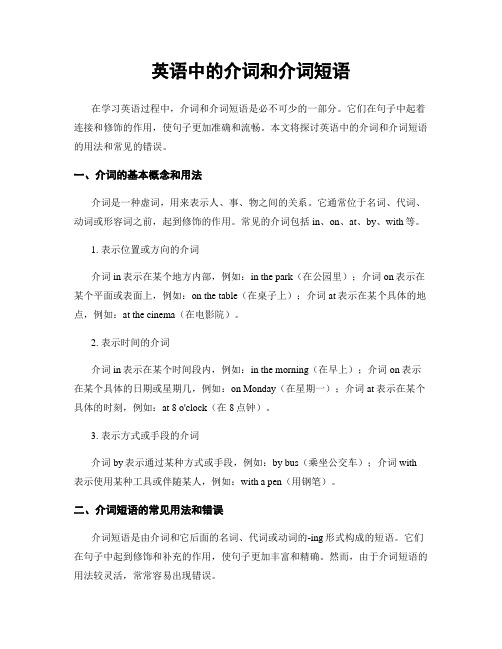
英语中的介词和介词短语在学习英语过程中,介词和介词短语是必不可少的一部分。
它们在句子中起着连接和修饰的作用,使句子更加准确和流畅。
本文将探讨英语中的介词和介词短语的用法和常见的错误。
一、介词的基本概念和用法介词是一种虚词,用来表示人、事、物之间的关系。
它通常位于名词、代词、动词或形容词之前,起到修饰的作用。
常见的介词包括in、on、at、by、with等。
1. 表示位置或方向的介词介词in表示在某个地方内部,例如:in the park(在公园里);介词on表示在某个平面或表面上,例如:on the table(在桌子上);介词at表示在某个具体的地点,例如:at the cinema(在电影院)。
2. 表示时间的介词介词in表示在某个时间段内,例如:in the morning(在早上);介词on表示在某个具体的日期或星期几,例如:on Monday(在星期一);介词at表示在某个具体的时刻,例如:at 8 o'clock(在8点钟)。
3. 表示方式或手段的介词介词by表示通过某种方式或手段,例如:by bus(乘坐公交车);介词with 表示使用某种工具或伴随某人,例如:with a pen(用钢笔)。
二、介词短语的常见用法和错误介词短语是由介词和它后面的名词、代词或动词的-ing形式构成的短语。
它们在句子中起到修饰和补充的作用,使句子更加丰富和精确。
然而,由于介词短语的用法较灵活,常常容易出现错误。
1. 错误的介词选择很多学习者在使用介词短语时容易选择错误的介词。
例如,错误的使用介词at表示在某个日期,而正确的应该是on。
另外,错误的使用介词in表示在某个时间点,而正确的应该是at。
2. 介词短语的位置错误有时候,介词短语的位置放置错误,导致句子的意思不清晰。
例如,错误的将介词短语放在句子的开头,而正确的位置应该是句子的结尾或名词的后面。
3. 错误的介词短语搭配有些介词短语的搭配是固定的,不能随意替换。
介词的种类及常见介词短语

介词的种类及常见介词短语介词是一类具有特殊语法功能的词汇,用来在句子中引导宾语和其他成分之间的关系。
介词可以独立使用,也可以与名词、代词等其他词语组成介词短语。
本文将介绍介词的种类及常见的介词短语。
一、介词的种类1. 位置介词:表示空间、方向、位置的介词,用来描述物体之间的位置关系。
例如:在、向、进、出、上、下等。
2. 时间介词:表示时间、日期、频率的介词,用来描述事件发生的时间关系。
例如:在、在…之前、在…之后、从…到…等。
3. 方式介词:表示方式、手段、状态的介词,用来描述事件发生的方式或表达某些特定的状态。
例如:用、以、以…为基础、以…为条件等。
4. 原因介词:表示原因和目的的介词,用来说明事件发生的原因或达到的目的。
例如:由于、因为、为了、以便、以此等。
5. 条件介词:表示条件的介词,用来陈述事件发生的先决条件。
例如:如果、只要、除非、无论等。
6. 目的介词:表示目的、目标的介词,用来表达事件行为的目的。
例如:为了、为着、为给…以…等。
7. 结果介词:表示结果和影响的介词,用来说明某个行为或事件产生的结果。
例如:因此、以致、使得、结果等。
8. 对比介词:表示对比关系的介词,用来进行对比、区分或对立的描述。
例如:与、和、跟、比、而等。
二、常见介词短语1. 在…之间:表示在两个或多个事物之间的位置或时间关系。
例如:在两座山之间、在周一和周二之间。
2. 由于…而:表示因为某个原因而导致的结果。
例如:由于天气原因而取消了比赛。
3. 对于…而言:表示针对某个人或事物的意见或观点。
例如:对于我来说,这是一个难题。
4. 与…相比:表示对比两个或多个事物之间的差异或关系。
例如:与其他城市相比,这个城市更繁华。
5. 针对…而言:表示对某个具体问题或对象的关注或处理。
例如:针对这个问题,我们需要采取有效的措施。
6. 在…基础上:表示在某个基础或前提条件下进行。
例如:在这个基础上,我们可以做一些拓展性的讨论。
介词和介词短语在中的运用总结
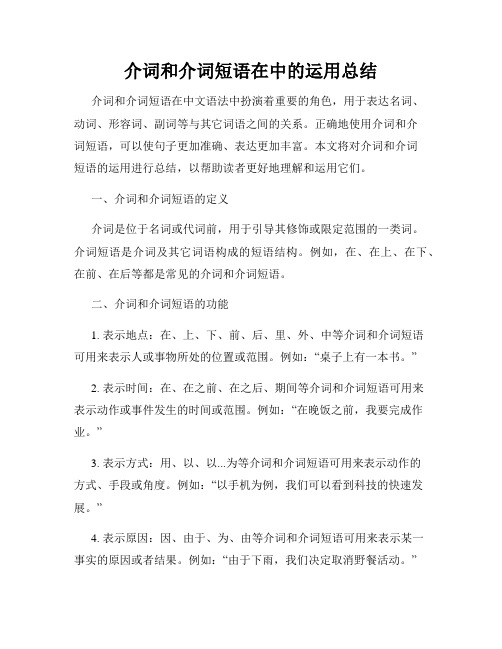
介词和介词短语在中的运用总结介词和介词短语在中文语法中扮演着重要的角色,用于表达名词、动词、形容词、副词等与其它词语之间的关系。
正确地使用介词和介词短语,可以使句子更加准确、表达更加丰富。
本文将对介词和介词短语的运用进行总结,以帮助读者更好地理解和运用它们。
一、介词和介词短语的定义介词是位于名词或代词前,用于引导其修饰或限定范围的一类词。
介词短语是介词及其它词语构成的短语结构。
例如,在、在上、在下、在前、在后等都是常见的介词和介词短语。
二、介词和介词短语的功能1. 表示地点:在、上、下、前、后、里、外、中等介词和介词短语可用来表示人或事物所处的位置或范围。
例如:“桌子上有一本书。
”2. 表示时间:在、在之前、在之后、期间等介词和介词短语可用来表示动作或事件发生的时间或范围。
例如:“在晚饭之前,我要完成作业。
”3. 表示方式:用、以、以...为等介词和介词短语可用来表示动作的方式、手段或角度。
例如:“以手机为例,我们可以看到科技的快速发展。
”4. 表示原因:因、由于、为、由等介词和介词短语可用来表示某一事实的原因或者结果。
例如:“由于下雨,我们决定取消野餐活动。
”5. 表示目的:为了、以便、以免等介词和介词短语可用来表示某一行为或动作的目的或结果。
例如:“为了学好英语,我每天都坚持练习。
”6. 表示条件:如果、除非、只要等介词和介词短语可用来表示某一条件的满足与否。
例如:“只要努力,就一定可以成功。
”7. 表示比较:和、跟、与等介词和介词短语可用来表示两者之间的比较关系。
例如:“他和我一样喜欢读书。
”8. 表示数量:有、没有、多少等介词和介词短语可用来表示数量的多少。
例如:“教室里有三十个学生。
”9. 表示状态:在、和、与等介词和介词短语可用来表示人或事物的状态。
例如:“他在疲倦中完成了工作。
”三、介词和介词短语的使用要点1. 根据具体的语境和需要选择合适的介词和介词短语。
例如,在表示时间时,可以使用“在...之前”、“在...之后”等;在表示地点时,可以使用“在...上”、“在...下”等。
英语中的介词和介词短语
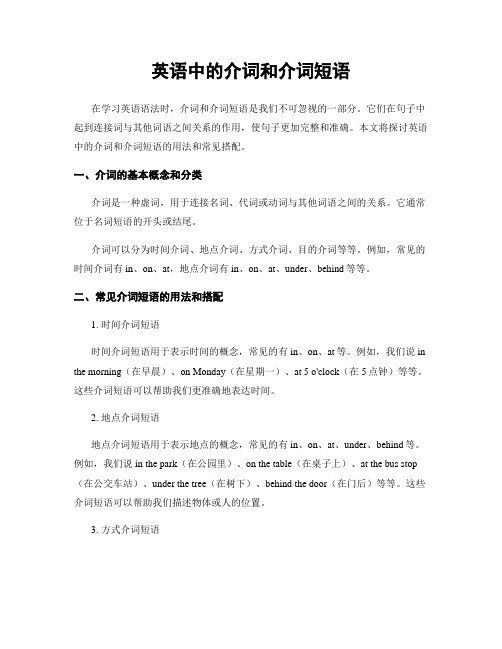
英语中的介词和介词短语在学习英语语法时,介词和介词短语是我们不可忽视的一部分。
它们在句子中起到连接词与其他词语之间关系的作用,使句子更加完整和准确。
本文将探讨英语中的介词和介词短语的用法和常见搭配。
一、介词的基本概念和分类介词是一种虚词,用于连接名词、代词或动词与其他词语之间的关系。
它通常位于名词短语的开头或结尾。
介词可以分为时间介词、地点介词、方式介词、目的介词等等。
例如,常见的时间介词有in、on、at,地点介词有in、on、at、under、behind等等。
二、常见介词短语的用法和搭配1. 时间介词短语时间介词短语用于表示时间的概念,常见的有in、on、at等。
例如,我们说in the morning(在早晨)、on Monday(在星期一)、at 5 o'clock(在5点钟)等等。
这些介词短语可以帮助我们更准确地表达时间。
2. 地点介词短语地点介词短语用于表示地点的概念,常见的有in、on、at、under、behind等。
例如,我们说in the park(在公园里)、on the table(在桌子上)、at the bus stop (在公交车站)、under the tree(在树下)、behind the door(在门后)等等。
这些介词短语可以帮助我们描述物体或人的位置。
3. 方式介词短语方式介词短语用于表示行为的方式或方法,常见的有by、with等。
例如,我们说by car(乘坐汽车)、with a pen(用一支笔)等等。
这些介词短语可以帮助我们描述行为或方式。
4. 目的介词短语目的介词短语用于表示目的或目标,常见的有for、to等。
例如,我们说study for the exam(为了考试而学习)、go to the park(去公园)等等。
这些介词短语可以帮助我们表达目的或动机。
三、介词和介词短语的常见错误用法在使用介词和介词短语时,我们需要注意一些常见的错误用法。
介词的知识点总结
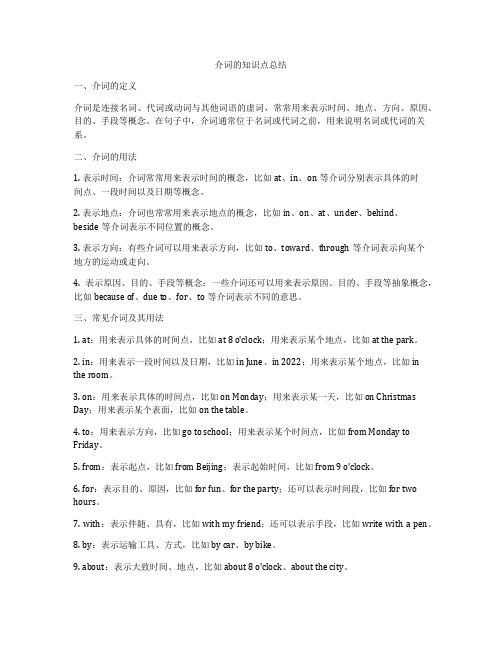
介词的知识点总结一、介词的定义介词是连接名词、代词或动词与其他词语的虚词,常常用来表示时间、地点、方向、原因、目的、手段等概念。
在句子中,介词通常位于名词或代词之前,用来说明名词或代词的关系。
二、介词的用法1. 表示时间:介词常常用来表示时间的概念,比如at、in、on等介词分别表示具体的时间点、一段时间以及日期等概念。
2. 表示地点:介词也常常用来表示地点的概念,比如in、on、at、under、behind、beside等介词表示不同位置的概念。
3. 表示方向:有些介词可以用来表示方向,比如to、toward、through等介词表示向某个地方的运动或走向。
4. 表示原因、目的、手段等概念:一些介词还可以用来表示原因、目的、手段等抽象概念,比如because of、due to、for、to等介词表示不同的意思。
三、常见介词及其用法1. at:用来表示具体的时间点,比如at 8 o'clock;用来表示某个地点,比如at the park。
2. in:用来表示一段时间以及日期,比如in June、in 2022;用来表示某个地点,比如in the room。
3. on:用来表示具体的时间点,比如on Monday;用来表示某一天,比如on Christmas Day;用来表示某个表面,比如on the table。
4. to:用来表示方向,比如go to school;用来表示某个时间点,比如from Monday to Friday。
5. from:表示起点,比如from Beijing;表示起始时间,比如from 9 o'clock。
6. for:表示目的、原因,比如for fun、for the party;还可以表示时间段,比如for two hours。
7. with:表示伴随、具有,比如with my friend;还可以表示手段,比如write with a pen。
of介词短语的用法
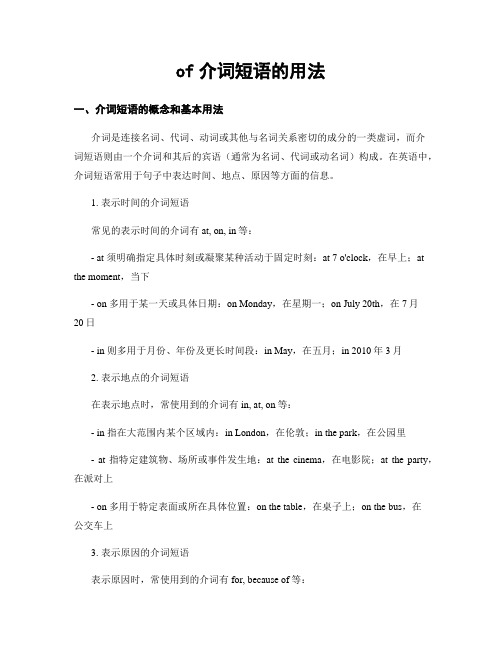
of介词短语的用法一、介词短语的概念和基本用法介词是连接名词、代词、动词或其他与名词关系密切的成分的一类虚词,而介词短语则由一个介词和其后的宾语(通常为名词、代词或动名词)构成。
在英语中,介词短语常用于句子中表达时间、地点、原因等方面的信息。
1. 表示时间的介词短语常见的表示时间的介词有at, on, in等:- at 须明确指定具体时刻或凝聚某种活动于固定时刻:at 7 o'clock,在早上;at the moment,当下- on 多用于某一天或具体日期:on Monday,在星期一;on July 20th,在7月20日- in 则多用于月份、年份及更长时间段:in May,在五月;in 2010年3月2. 表示地点的介词短语在表示地点时,常使用到的介词有in, at, on等:- in 指在大范围内某个区域内:in London,在伦敦;in the park,在公园里- at 指特定建筑物、场所或事件发生地:at the cinema,在电影院;at the party,在派对上- on 多用于特定表面或所在具体位置:on the table,在桌子上;on the bus,在公交车上3. 表示原因的介词短语表示原因时,常使用到的介词有for, because of等:- for 表示目的、理由、对比等:for fun,为了好玩;for health,为了健康- because of 用于解释事情发生的原因:because of the rain,因为下雨二、常见介词短语搭配及用法示例1. at the beginning of 在...开始时例如:"At the beginning of the movie, everyone was excited and anticipating a great story."2. in front of 在...前面例如:"The car is parked in front of the building."3. on top of 在...之上例如:"There is a bird nesting on top of the tree."4. by means of 借助,通过例如:"We communicate with each other by means of email and social media."5. because of 由于,因为例如:"The flight was canceled because of bad weather."6. for the sake of 为了...起见例如:"He quit his job for the sake of his family's happiness and well-being."7. behind schedule 超过预定时间,晚点例如:"The project is behind schedule due to unexpected issues."8. in case 以防万一例如:"I always carry an umbrella in case it rains."9. with regard to 关于,就...而言例如:"With regard to your question, I think it's better to consult an expert."10. on behalf of 代表...,为了...例如:"I am here today to speak on behalf of the entire team."三、介词短语的用法注意事项1. 特定搭配与习惯用语:有些介词短语常被固定使用在一起,形成特定含义。
介词的概念与运用

介词的概念与运用介词是英语语法中的一种重要词类,常被用来表示名词或代词与其他词之间的关系。
介词通常用来描述时间、地点、方向、方式等多种概念。
在本文中,我们将探讨介词的概念、分类以及常见的运用。
一、介词的概念介词是一类短小的词语,通常由一个词素构成,用来表示名词或代词与其他词之间的关系。
介词通常位于名词或代词之前,构成介词短语。
介词短语在句子中充当状语,用来修饰动词、形容词或副词,起到进一步明确修饰的作用。
二、介词的分类介词按照用途和含义的不同,可以分为以下几类:1. 时间介词:表示时间概念,例如at、in、on等。
比如:“I will meet you at 5 o'clock.”(我将在5点钟见你。
)2. 地点介词:表示地点概念,例如in、on、at等。
比如:“He is sitting on the chair.”(他正在椅子上坐着。
)3. 方向介词:表示方向概念,例如to、from、through等。
比如:“She walked to the park.”(她走到了公园。
)4. 抽象介词:表示抽象概念,例如by、for、with等。
比如:“He succee ded by hard work.”(他通过努力取得了成功。
)5. 其他介词:表示其他概念,例如about、above、below等。
比如:“The book is about history.”(这本书是关于历史的。
)三、介词的运用介词的运用主要包括以下几个方面:1. 时间介词的运用:用来表示时间的介词常常与特定的时间短语搭配使用,例如at night(在晚上)、in the morning(在早上)、on Sunday(在星期日)等。
介词短语通常放在句子的结尾或动词之后。
2. 地点介词的运用:用来表示地点的介词可以指示具体的地点或空间关系。
例如,in表示在某个范围之内,on表示在某个表面之上,at表示在某个点或地方。
比如:“The cat is in the box.”(猫在盒子里。
认识英语中的介词和介词短语

认识英语中的介词和介词短语英语中的介词和介词短语是语法中非常重要的一部分,它们在句子中起到连接词和短语的作用。
在这篇文章中,我们将详细了解介词和介词短语的用法和常见的错误。
一、介词的定义和用法介词是一种虚词,用来表示两个词或短语之间的关系。
它通常放在名词、代词、动词或句子的结构中。
常见的介词有at, in, on, with, to, for等。
以下是一些常见的介词用法:1. 表示位置关系:in, on, at介词"in"用于表示在某个范围或物体内部。
例如:- I am in the classroom.- The book is in the bag.介词"on"用于表示在某个表面或平面上。
例如:- The pen is on the desk.- The picture is on the wall.介词"at"用于表示在某个具体的位置或事件上。
例如:- She is at the park.- He is at the party.2. 表示时间关系:in, on, at介词"in"用于表示在某个时间段内。
例如:- I will meet him in the morning.- We have a party in the evening.介词"on"用于表示在某个具体的日期或星期几。
例如:- We will have a meeting on Monday.- The concert is on the 25th of December.介词"at"用于表示在某个具体的时刻。
例如:- They will arrive at 8 o'clock.- The movie starts at 9:30.3. 表示方式和原因:with, to, for介词"with"用于表示使用某个工具、方式或伴随着某人。
英语中介词的意思及用法
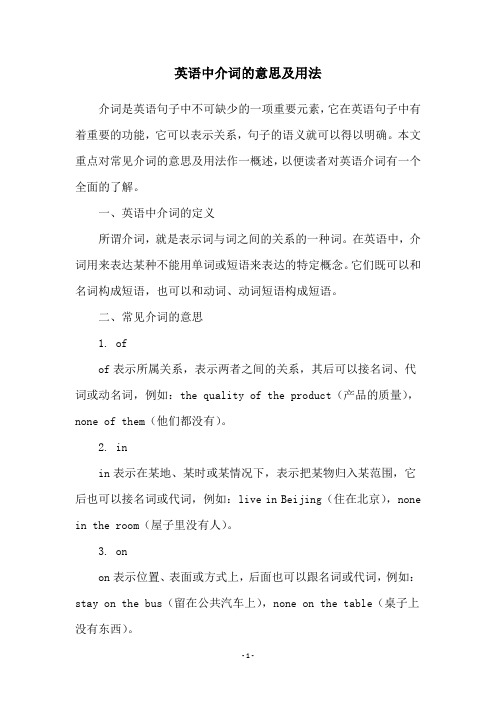
英语中介词的意思及用法介词是英语句子中不可缺少的一项重要元素,它在英语句子中有着重要的功能,它可以表示关系,句子的语义就可以得以明确。
本文重点对常见介词的意思及用法作一概述,以便读者对英语介词有一个全面的了解。
一、英语中介词的定义所谓介词,就是表示词与词之间的关系的一种词。
在英语中,介词用来表达某种不能用单词或短语来表达的特定概念。
它们既可以和名词构成短语,也可以和动词、动词短语构成短语。
二、常见介词的意思1. ofof表示所属关系,表示两者之间的关系,其后可以接名词、代词或动名词,例如:the quality of the product(产品的质量),none of them(他们都没有)。
2. inin表示在某地、某时或某情况下,表示把某物归入某范围,它后也可以接名词或代词,例如:live in Beijing(住在北京),none in the room(屋子里没有人)。
3. onon表示位置、表面或方式上,后面也可以跟名词或代词,例如:stay on the bus(留在公共汽车上),none on the table(桌子上没有东西)。
4. byby表示手段、方法、途径、时间或位置,它也可以接名词或代词,例如:buy it by credit card(用信用卡买),none by the window (窗边没有人)。
5. withwith表示伴随、共同、同时或配备,它也可以接名词或代词,例如:go with me(和我一起走),none with him(他没有伴随者)。
6. fromfrom表示起始点,来自、出自或表示离开,它也可以接名词或代词,例如:come from Beijing(来自北京),none from the school (学校里没有人)。
7. toto表示方向或目的地,它也可以接名词或代词,例如:go to Beijing(去北京),none to the shop(商店里没有人)。
介词和介词短语

介词和介词短语概念: 介词是一种用来表示词与词,或者词与句之间的关系的词,在句中不能单独作句子成分。
介词一定要有宾语,充当宾语的一般有名词、代词或相当于名词的其他词、短语或句子,短语或从句。
重点:介词和介词短语的用法难点:介词的用法与辨析内容:一、介词概述1. 介词的种类(1)简单介词,如 at, in off, on, by, to, with 等。
(2)合成介词,如 into, inside, within, throughout 等。
(3)短语介词,如 according to, because of, in addition to, in front of, in spite of 等。
(4)二重介词,如 from behind, from among, until after, at about 等。
2. 介词的宾语(1)名词:Let’s go for a walk along the river.咱们到江边散散步。
(2)代词:He’s standing in front of m e.我站在我前面。
(3)形容词: Her pronunciation is far from prefect.她的语音远不是完美的。
(4)动名词:He’s good at drawing.他善长绘画。
(5)过去分词:I took it for granted that she was for England.我还以为她是英国的。
(6)不定式:I had no choice but to lie down.除了躺下外我别无选择。
She did nothing but cry.她只是哭。
注: 介词后通常是不能用不定式作宾语的, 只有表示“除……外”的 but, except 等个别介词能接不定式作宾语。
前面有行为动词 do 时,不定式不用 to,否则要带 to。
(7)副词: I didn’t know it until recently.直到最近我才知道此事。
九年级英语专题复习教案:介词和介词短语知识讲解(中考资料)
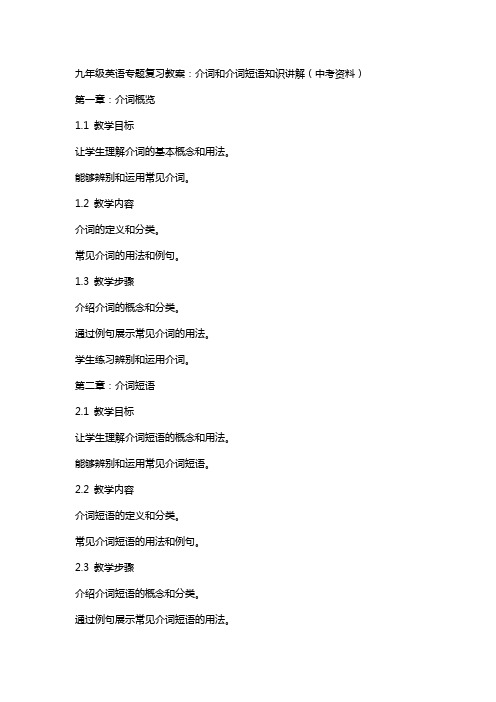
九年级英语专题复习教案:介词和介词短语知识讲解(中考资料)第一章:介词概览1.1 教学目标让学生理解介词的基本概念和用法。
能够辨别和运用常见介词。
1.2 教学内容介词的定义和分类。
常见介词的用法和例句。
1.3 教学步骤介绍介词的概念和分类。
通过例句展示常见介词的用法。
学生练习辨别和运用介词。
第二章:介词短语2.1 教学目标让学生理解介词短语的概念和用法。
能够辨别和运用常见介词短语。
2.2 教学内容介词短语的定义和分类。
常见介词短语的用法和例句。
2.3 教学步骤介绍介词短语的概念和分类。
通过例句展示常见介词短语的用法。
学生练习辨别和运用介词短语。
第三章:介词和介词短语的辨析3.1 教学目标让学生能够辨别和正确运用介词和介词短语。
3.2 教学内容介词和介词短语的辨析方法。
常见介词和介词短语的混淆点。
3.3 教学步骤介绍介词和介词短语的辨析方法。
通过例题展示常见介词和介词短语的混淆点。
学生进行辨析练习。
第四章:介词和介词短语的运用4.1 教学目标让学生能够熟练运用介词和介词短语。
4.2 教学内容介词和介词短语的运用技巧。
常见介词和介词短语的运用场景。
4.3 教学步骤介绍介词和介词短语的运用技巧。
通过例题展示常见介词和介词短语的运用场景。
学生进行运用练习。
第五章:中考介词和介词短语题型解析5.1 教学目标让学生了解中考介词和介词短语的题型。
掌握解题技巧和方法。
5.2 教学内容中考介词和介词短语的题型分析。
解题技巧和方法。
5.3 教学步骤分析中考介词和介词短语的题型。
分享解题技巧和方法。
学生进行真题练习。
第六章:介词和介词短语的综合练习6.1 教学目标让学生通过综合练习巩固介词和介词短语的知识。
提高学生的综合运用能力。
6.2 教学内容综合练习题:包括选择题、填空题、改错题等。
6.3 教学步骤给学生发放综合练习题。
学生独立完成练习题。
老师讲解答案并指出学生常见错误。
第七章:介词和介词短语的拓展知识7.1 教学目标让学生了解介词和介词短语的拓展知识。
英语介词作用
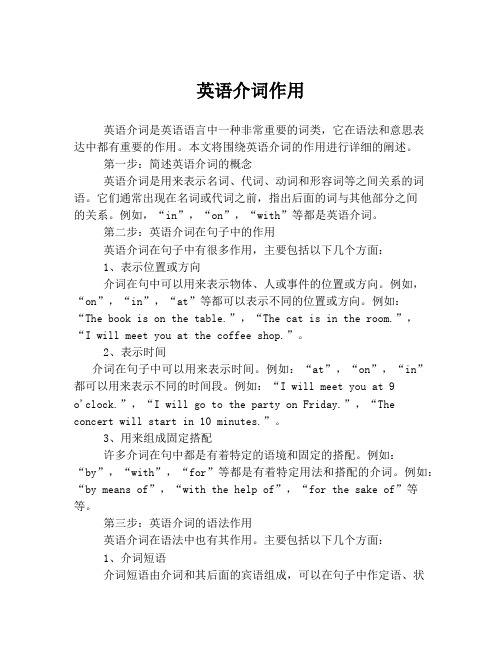
英语介词作用英语介词是英语语言中一种非常重要的词类,它在语法和意思表达中都有重要的作用。
本文将围绕英语介词的作用进行详细的阐述。
第一步:简述英语介词的概念英语介词是用来表示名词、代词、动词和形容词等之间关系的词语。
它们通常出现在名词或代词之前,指出后面的词与其他部分之间的关系。
例如,“in”,“on”,“with”等都是英语介词。
第二步:英语介词在句子中的作用英语介词在句子中有很多作用,主要包括以下几个方面:1、表示位置或方向介词在句中可以用来表示物体、人或事件的位置或方向。
例如,“on”,“in”,“at”等都可以表示不同的位置或方向。
例如:“The book is on the table.”,“The cat is in the room.”,“I will meet you at the coffee shop.”。
2、表示时间介词在句子中可以用来表示时间。
例如:“at”,“on”,“in”都可以用来表示不同的时间段。
例如:“I will meet you at 9o'clock.”,“I will go to the party on Friday.”,“The concert will start in 10 minutes.”。
3、用来组成固定搭配许多介词在句中都是有着特定的语境和固定的搭配。
例如:“by”,“with”,“for”等都是有着特定用法和搭配的介词。
例如:“by means of”,“with the help of”,“for the sake of”等等。
第三步:英语介词的语法作用英语介词在语法中也有其作用。
主要包括以下几个方面:1、介词短语介词短语由介词和其后面的宾语组成,可以在句子中作定语、状语或补语。
例如:“The book on the table is mine.”,“He fell asleep during the class.”,“I am proud of you.”。
- 1、下载文档前请自行甄别文档内容的完整性,平台不提供额外的编辑、内容补充、找答案等附加服务。
- 2、"仅部分预览"的文档,不可在线预览部分如存在完整性等问题,可反馈申请退款(可完整预览的文档不适用该条件!)。
- 3、如文档侵犯您的权益,请联系客服反馈,我们会尽快为您处理(人工客服工作时间:9:00-18:30)。
•介词和介词短语的概念:介词是一种用来表示词与词、词与句之间的关系的虚词,在句中不能单独作句子成分。
介词后面一般有名词、代词或相当于名词的其他词类,短语或从句作它的宾语。
介词和它的宾语构成介词词组,在句中作状语,表语,补语或介词宾语。
介词可以分为时间介词、地点介词、方式介词和其他介词。
•误用介词的三种情况:1、多用介词:多用介词可能是受汉语意思的影响将及物动词误用作不及物动词,也可能是受相关结构的影响而用错:误:We discussed about the plan.正:We discussed the plan. 我们讨论了计划。
误:Did he mention about the accident?正:Did he mention the accident? 他提到那次事故了吗?误:I saw her enter into the bank.正:I saw her enter the bank. 我看见她进了银行。
误:He married with[to] a nurse.正:He married a nurse. 他同一位护士结了婚。
误:How can contact with you?正:How can contact you? 我怎么与你联系?误:We should serve for the people heart and soul.正:We should serve the people heart and soul. 我们应该全心全意地为人民服务。
误:Who controls over the factory? (但名词control可接over)正:Who controls the factory? 谁管理这个工厂?误:He has a great many of friends here. (比较a great number of)正:He has a great many friends here. 他在这儿有很多朋友。
2、漏用介词:漏用介词可能是受汉语意思的影响将不及物动词误用作及物动词,或是受相关结构的影响的影响而用错等:误:This matter is difficult to deal. (deal with=处理)正:This matter is difficult to deal with. 这事很难处理。
误:He is not a man to be depended.正:He is not a man to be depended on. 他不是个可靠的人。
误:He took a cup of tea, and went on the story.正:He took a cup of tea, and wentonwiththestory.他喝了一口茶,又接着讲故事。
误:My mother still regards me a child. (比较consider…as中的as可省略)正:My mother still regards me as a child. 我母亲还把我当小孩看。
误:They insisted sending a car over to fetch us.正:They insisted on sending a car over to fetch us.他们坚持要派车来接我们。
误:What he says is worth listening.正:What he said is worth listening to.他的话值得一听。
3、错用介词:错用介词的情况比较复杂,可能是因受汉语意思的而错,也可能是因弄不清搭配关系而错,可能是混淆用法而错,也可能是受相关结构的影响而错,可能是忽略语境而错,也可能是想当然的用错:误:She called on his office yesterday. (call on+人,call at+地点)正:She called at his office yesterday. 她昨天去了他办公室拜访。
误:He is engaged with a nurse.正:He is engaged to a nurse.他与一位护士订了婚。
误:The sun rises from the east.正:The sun rises in the east.太阳从东方升起。
误:Under his help, I finished it in time.正:With his help, I finished it in time. 在他的帮助下,我及时做完了。
误:During he was in Japan, he visited many places.正:During his stay in Japan, he visited many places.他在日本期间,参观过许多地方。
误:We are familiar to his character.正:We are familiar with his character.我们了解他的性格。
误:Help yourself with the fruit.正:Help yourself to the fruit.吃点水果吧。
•介词的宾语:1、名词或代词作介词宾语:如:Are you interested in history? 你对历史感兴趣吗?Don't worry about it. 别为它担心。
注:若是人称代词用作介词宾语,要注意用宾格。
如:No one can sing like her. 没有人能像她那样唱歌。
(不能用like she)2、动名词作介词宾语:如:He is good at telling stories. 他善于讲故事。
In crossing the street he was run over. 他在穿过马路时被汽车撞倒。
3、过去分词作介词宾语:如:We can't regard the matter as settled. 我们不能认为这事已经解决。
I take it for granted you have read the book. 我以为你读过这本书。
注:过去分词用作介词宾语通常只见于某些固定结构中,如上面第1句涉及regard…as(认为…是)结构,第2句涉及take sth for granted(认为某事属实)。
在其他情况下,介词后通常不直接跟过去分词作宾语,若语义上需要接过去分词(表被动),可换用“being+过去分词”:如:He went out without being seen by the others.他出去了,没有被其他人看见。
4、从句作介词宾语:如:He was not satisfied with what she said. 他对她说的不满意。
I'm worried about where he is. 我担心他上哪儿去了。
注:介词后通常不接that从句,遇此情况需考虑用其他结构:误:He paid no attention to that she was poor.正:He paid no attention to the fact that she was poor. 他根本不注意她很穷这一事实。
但有个别介词(如except)可接that从句。
比较:I know nothing about him except that he lives next door./I know nothing about him except for the fact that he lives next door. 我只知道他住在隔壁,其它的就不知道了。
5、不定式作介词宾语:如:I had no choice but to wait. 除了等,我没有别的选择。
He wanted nothing but to stay there. 他只想留在那儿。
They did nothing but complain. 他们老是一个劲地抱怨。
He never did anything but watch TV. 除了看电视,他从不干任何事。
注:(1)介词后接不定式的情形通常只见于but, except等极个别个词。
该不定式有时带to,有时不带to,其区别是:若其前出现了动词do,其后的不定式通常不带to;若其前没有出现动词do,则其后的不定式通常带to。
(2)介词后虽然通常不直接跟不定式作宾语,但却可接“连接代词(副词)+不定式”结构:如:He gave me some advice on how to do it. 对于如何做这事他给我提了些建议。
6、形容词作介词宾语:如:Her pronunciation is far from perfect. 她的语音远不是完美的。
In short, we must be prepared. 总而言之,我们要有准备。
Things have gone from bad to worse. 事情越来越糟。
注:(1)有些形容词用作介词宾语可视为其前省略了动名词being:如:He regarded the situationas(being) serious. 他认为形势严重。
His work is far from(being) satisfactory. 他的工作丝毫不令人满意。
(2)有些“介词+形容词”的结构已构成固定搭配:in full全部地,全面地,无省略地;in private私下地,秘密地;in particular特别地;in general一般地,通常地,概括地;in brief 简言之;in short总之,简言之;in vain徒然地,徒劳无益地;for fee免费地,无偿地;for certain肯定地,确切地;for sure肯定地,确切地;for short为了简短,简称;atl arge自由自在地,逍遥法外;by far…得多7、副词作介词宾语:如:I can't stay for long. 我不能久呆。
It's too hot in here. 这里面太热了。
I looked every where except there. 除了那儿,我到处都看过了。
8、数词作介词宾语:如:The city has a population of four million. 这座城市有四百万人口。
He was among the first to arrive. 他是第一批到的。
9、介词短语作介词宾语:如:Choose a book from among these. 从这些书中选一本吧。
